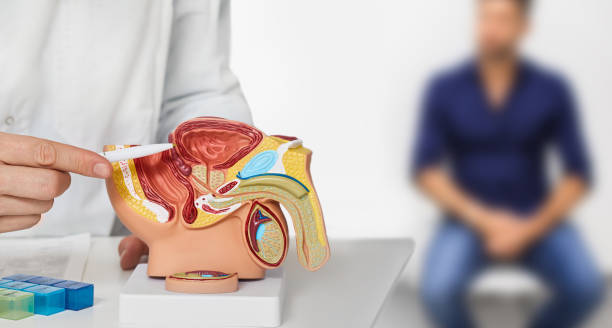|
Prostate cancer is the most common type of cancer among adult men, with more than 230,000 new cases diagnosed each year. Its peak incidence is 70-plus years of age; however, it can also manifest itself in much younger men. Fortunately, prostate cancer is one of the most treatable forms of cancer. It’s also one of the few types that has seen a significant reduction in mortality rates due to early diagnosis and improved treatment strategies. However, there are many risk factors that increase a man’s likelihood of developing prostate cancer. Listed below are some of the highest-risk factors for this disease.
Family History While it may not be possible to change your family history, it’s important to be aware of it, especially if several men in your family have experienced prostate cancer. This is partly because of inherited genetic predispositions. Some genes have been found to be associated with an increased risk of prostate cancer. Among these are genes that affect the immune system, metabolism of chemical substances, and cell reproduction. Men who are aware of a family history of prostate cancer have a better chance of being diagnosed at an early stage, when the prognosis is better. If you have a family history of prostate cancer, you should discuss getting tested for the disease with your doctor. If you have a family history of prostate cancer, talk to your doctor about getting tested for the disease. Early detection is key to successful treatment. Age Age is a significant risk factor for prostate cancer. The likelihood of contracting the disease increases with age. Research suggests that approximately 1% of men in their 40s, 10% of men in their 60s, 25% of men in their 70s, and over 50% of men over the age of 85 have prostate cancer. It’s believed that the male sex hormone, testosterone, plays a role in the onset of the disease. It’s thought that higher levels of testosterone may cause mutated cells to grow at a faster rate than normal cells. This may lead to the formation of prostate cancer. Additionally, some research indicates that testosterone may lead to the spread of prostate cancer by altering the structure of blood vessels. Diet and Lifestyle The link between diet and prostate cancer isn’t clear-cut. However, there are certain foods and lifestyle factors that are known to have a role in increasing the risk of this disease. One study found a link between eating more animal fats, such as those found in meat and dairy products, and the risk of prostate cancer. On the other hand, eating foods high in antioxidants, such as berries, tomatoes, and spinach, is thought to decrease the risk of developing the disease. There’s also evidence that a diet high in calories and low in fiber increases the risk of prostate cancer. A low intake of dietary fiber has been linked to an increased risk of this disease. This is thought to be due to the fact that high-calorie diets are associated with an increased level of the male hormone, testosterone, which may increase the risk of prostate cancer. While the exact nature of the connection between diet and prostate cancer is unclear, the research suggests that certain foods may increase or decrease the likelihood of developing the disease. Sedentary Behavior Men who don’t exercise or engage in any physical activity on a regular basis are at a higher risk of developing prostate cancer. This particular risk factor is believed to be due to insulin resistance and increased levels of insulin in the blood. Men who are overweight or obese are more likely to be insulin-resistant, which is a precursor to the development of type 2 diabetes. This makes it more likely for them to develop prostate cancer. Obese people are more likely to have high blood pressure. High blood pressure is believed to play a role in the formation of prostate cancer by increasing the amount of insulin in the blood. Men who are overweight or obese are also more likely to have a poor diet, which is also linked to insulin resistance and an increased risk of developing prostate cancer. Genetics Some studies indicate that having certain gene mutations may increase the risk of developing prostate cancer. This is especially true in men of East Asian descent, who are 10 times more likely to develop this disease than men of European descent. However, it’s important to note that having a genetic risk factor doesn’t mean that you will definitely develop prostate cancer. It simply means that you are more likely to get the disease than someone who doesn’t have a genetic predisposition. It’s also important to note that these genetic mutations can be passed down from generation to generation. This means that if your father or brother has prostate cancer, there’s an increased chance that you will get it as well. Exposure to Radiation and Chemicals Some types of radiation, such as X-rays, may increase the risk of developing prostate cancer. This is particularly the case if you were exposed to a high level of X-rays as a child or young adult. If you have a family history of prostate cancer, have a diet high in fats, and have been exposed to high levels of radiation, the risk of developing the disease increases even more. Other chemicals and toxins that may cause or increase the risk of developing prostate cancer include pesticides, herbicides, and benzene. Men who work in occupations that involve exposure to these chemicals should take precautions to minimize their risk of developing prostate cancer. While prostate cancer is a serious disease, there are a few things you can do to reduce your risk of developing the disease. Maintain a balanced diet, don’t smoke, exercise regularly, and limit your exposure to harmful chemicals and toxins. Early diagnosis of this disease is crucial, as it allows for a better prognosis in most cases. With the right treatment, many men are able to lead a full and healthy life even after being diagnosed with prostate cancer.
0 Comments
Your comment will be posted after it is approved.
Leave a Reply. |
Read More
All
|


 RSS Feed
RSS Feed